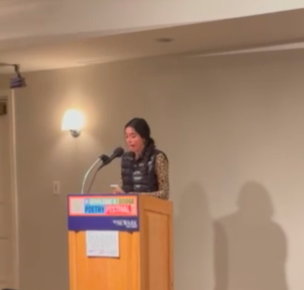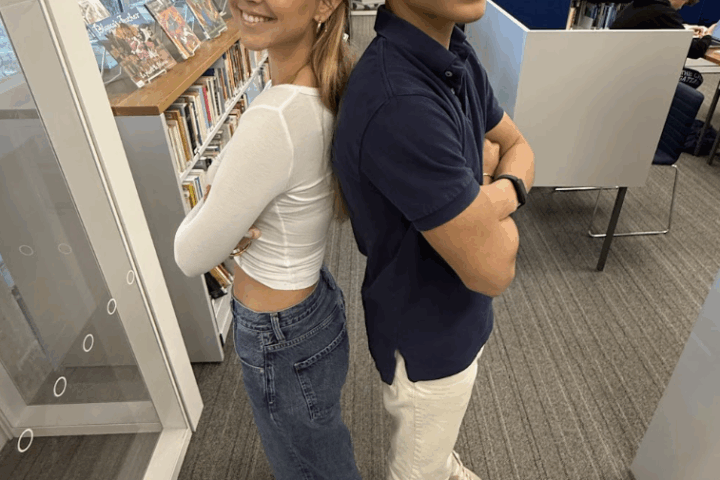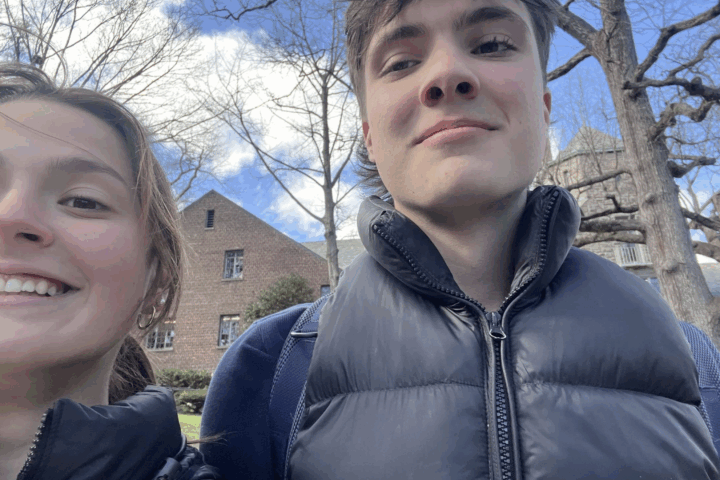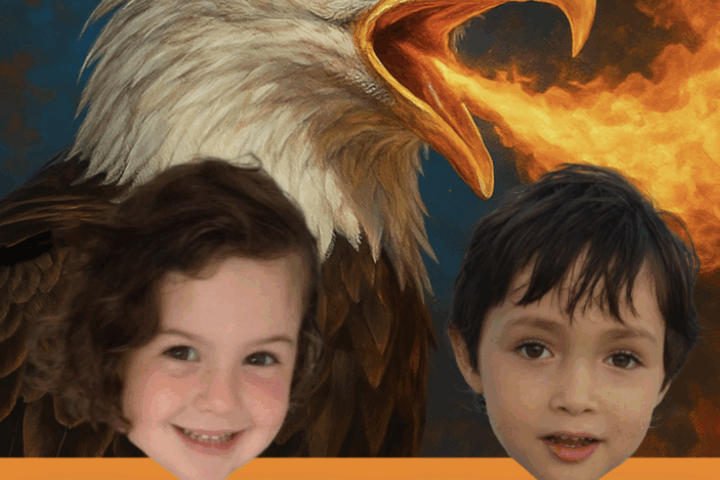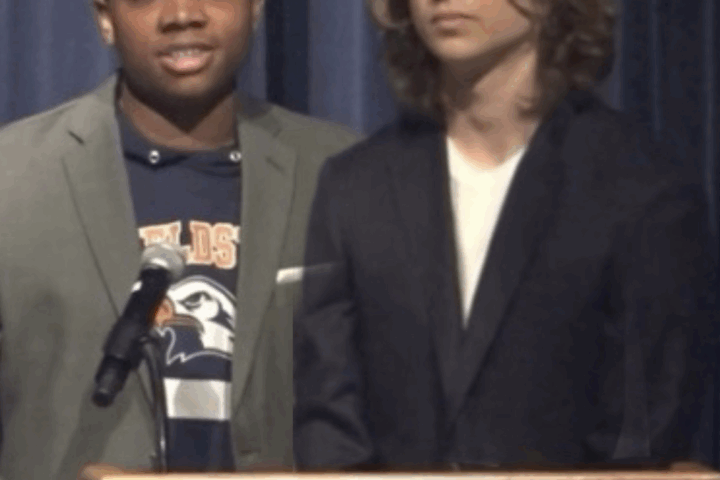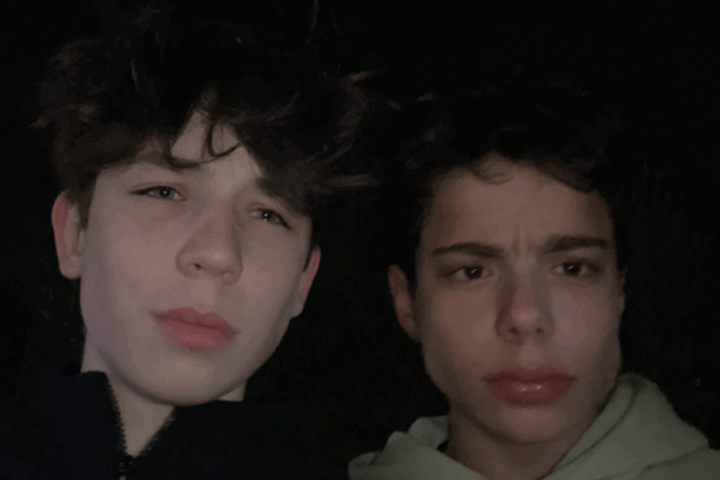I used to think that poetry had to rhyme. Whenever I would write, I would grab my rhyming dictionary just so my poem could be valid.
I signed up for the Dodge Poetry Field Trip organized by English teacher and poet, Michael Morse, in a desperate attempt to learn more as a young writer and poet. I didn’t know of any other person who had signed up. Though small in numbers, the other people who signed up – Hannah Mayerfield (VI), Soren Stearns (VI) and Grace Negroni (V) – were just as eager to listen to poetry as I was. On the train ride there, we reviewed the sessions and which poets were talking at which session and got to know one another.
Taking place in Newark’s Downtown Art District, the landscape was beautiful. Though it was that time of the year to start zipping up your jackets, you could mistake the whole scene for just another day in Spring. With people directing you to the right and brochures to the left, it was hard to get lost. Together, we headed to the Festival Poets Reading session with Jubi Arriola-Headley, Marlanda Dekine, Cindy King and Peggy Robles-Alvarado. All the poets were down to earth, but I was mesmerized by listening to Peggy Robles-Alvarado. This is a few lines from her poem, Why I Avoid Writing About Birds:
Mami had three wooden parakeet cages that hung in the hallway of our apartment
filled them with bright yellow and green budgies
one for each member of our family
mine was blue
blue budgies are bred for the pet trade
not normally found in nature
beautiful mutants
Tamed and homebound
never meant to be seen in the wild
Mami’s birds weren’t trained to fly around knick-knacks like Tía Lety’s
didn’t sit on the armrest and learn Spanish curse words like Tía Delia’s
Mami’s birds made static movements
plotted in loud chirps each time she opened the cage to replace soiled newspaper
aimed and lunged past her hand
their attempts for freedom failing miserably on screened windows and doors that led to other doors
The way she used Spanglish (as lines later show throughout the poem) to create a masterpiece of poems that had deep sentimental value from basic concepts was eye-opening to a young poet like me. It was not that she rhymed and it wasn’t that she used repetition as her tool of writing, it was the way she recited the words she formulated as if they’d been there all along. I grew excited each time she announced she had another poem to read. She read a total of three.
Next session, Negroni and I, who had stuck together, decided we should let Morse wander off by himself. We then headed to a session called Poetry and Conversation: Readings and Q & A with J. Mae Barizo, Shara McCallum, Tom Sleigh. The amount of schools that were at the festival was alarming, especially because I had never heard about this Festival until Bob Montera mentioned it to me a few months ago. There were a variety of sessions and yet each and every one was packed. Negroni and I both ended up seeing people we knew!
The second session was just as engaging. The beauty in hearing people read their poetry aloud is hearing the stories that came with it. The background that they shared made it hard to lose my short attention span. One poet, Shara McCallum, wrote about the difficulties after the death of her husband while another, Tom Sleigh, wrote about his abusive father. Everything I heard was unique and I thought to myself, I’m so glad I came.
When it came time for the Q & A, Negroni and I challenged ourselves to ask a question. It was something I would never do in an environment where I knew everyone, but here there were lines of people with questions, who even came back for seconds. Though I was nervous to speak in a room full of people, the poets answered my questions with smiles across their faces and made me feel like I was one of them. It was definitely a confidence boost.
The next session was my last, so Negroni and I headed to an open mic. When we went to the open mic, I didn’t expect us to be the people it was open to. There was not an overwhelming amount of people at this one, so Negroni and I put our names down to read. It was the first time I publicly shared my poetry with a crowd and I put myself second to get it over with.
What I read was not necessarily a poem; it certainly didn’t rhyme and it flowed more like an essay, but the “alrights” and applause I got from the crowds was enough for me to come home with a smile on my face. Negroni read hers and did a beautiful job, impressing the crowd with her imagery. When asked to reflect on it, she said, “It was great to have an experience at an event dedicated to poetry as I have not been to any poetry readings, and I was super proud to be able to share my poems outside of my friendship bubble.”
Sometimes at Fieldston I feel unexposed to the way people express themselves (probably because we are all so private, which makes sense). But to hear young poets “try new things out” and intimidate me with their work was something that made me excited for my future as a poet.
“Bringing Fieldston students to the Dodge has always been a favorite field trip. Experiencing so many different poets in multiple venues allows our kids a unique experience steeped in thought and feeling and language. It’s even more magical that they get to share this elevated attention to poetry and poets with thousands of other students from around the country,” Morse said when asked to elaborate on the opportunities presented at Dodge.
I am grateful I wound up going to the Dodge Poetry Festival. I hope it earns the hype it deserves because it is truly an opportunity of a lifetime for any writer looking to learn something new.



